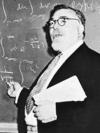- Wiener, Norbert
-
born Nov. 26, 1894, Columbia, Mo., U.S.died March 18, 1964, Stockholm, Swed.U.S. mathematician.He earned a Ph.D. from Harvard at 18. He joined the faculty of MIT in 1919. His work on generalized harmonic analysis and Tauberian theorems (which deduce the convergence of an infinite series) won the American Mathematical Society's Bôcher Prize in 1933. The origin of cybernetics as an independent science is generally dated from the 1948 publication of his Cybernetics. He made contributions to such areas as stochastic processes, quantum theory, and, during World War II, gunfire control. Crater Wiener on the Moon is named for him.
 Norbert Wiener.Courtesy of the Library of Congress, Washington, D.C.
Norbert Wiener.Courtesy of the Library of Congress, Washington, D.C.* * *
▪ American mathematicianborn November 26, 1894, Columbia, Missouri, U.S.died March 18, 1964, Stockholm, SwedenAmerican mathematician who established the science of cybernetics. He attained international renown by formulating some of the most important contributions to mathematics in the 20th century.Wiener, a child prodigy whose education was controlled by his father, a professor of Slavonic languages and literature at Harvard University, graduated in mathematics from Tufts College (now Tufts University, Medford, Massachusetts) in 1909 at the age of 14. He spent a year at Harvard as a graduate student in zoology but left after he found that he was inept at laboratory work. At his father's suggestion, he began to study philosophy, and he completed a Ph.D. at Harvard in 1913 with a dissertation on mathematical logic (logic).On a grant from Harvard, Wiener went first to England, to study mathematical logic at the University of Cambridge (Cambridge, University of) under Bertrand Russell (Russell, Bertrand), and then to the University of Göttingen (Göttingen, University of) in Germany, to study with David Hilbert (Hilbert, David). On the advice of Russell, he also began a serious study of general mathematics, in which he was strongly influenced by Russell, by the English pure mathematician Godfrey Hardy (Hardy, Godfrey Harold), and to a lesser extent by Hilbert. He published his first paper in the mathematical journal Messenger of Mathematics in 1913 at Cambridge.When World War I broke out, he tried to enlist but was rejected because of poor eyesight. For five years he tried a variety of occupations. He was a teacher at the University of Maine (Maine, University of), a writer for an encyclopaedia, an apprentice engineer, a journalist of sorts, and a mathematician at the Aberdeen (Maryland) Proving Grounds. Finally, in 1919, he was hired as an instructor by the mathematics department at the Massachusetts Institute of Technology (MIT), a department with no real tradition of scholarship or research at that time. It turned out, however, to have been the right move for Wiener, for he had entered upon an extremely productive period, just as MIT itself was beginning to develop into a great centre of learning in science and technology. Wiener remained on the MIT faculty until his retirement.During the 1920s Wiener did highly innovative and fundamental work on what are now called stochastic processes (stochastic process) and, in particular, on the theory of Brownian motion and on generalized harmonic analysis, as well as significant work on other problems of mathematical analysis. In 1933 Wiener was elected to the National Academy of Sciences but soon resigned, repelled by some of the aspects of institutionalized science that he encountered there.During World War II Wiener worked on the problem of aiming gunfire at a moving target. The ideas that evolved led to Extrapolation, Interpolation, and Smoothing of Stationary Time Series (1949), which first appeared as a classified report and established Wiener as a codiscoverer, with the Russian mathematician Andrey Kolmogorov (Kolmogorov, Andrey Nikolayevich), of the theory on the prediction of stationary time series. It introduced certain statistical methods into control and communications engineering and exerted great influence in these areas. This work also led him to formulate the concept of cybernetics.In 1948 his book Cybernetics; or, Control and Communication in the Animal and the Machine was published. For a scientific book it was extremely popular, and Wiener became known in a much broader scientific community. Cybernetics is interdisciplinary in nature; based on common relationships between humans and machines, it is used today in control theory, automation theory (automation), and computer programs to reduce many time-consuming computations and decision-making processes formerly done by human beings. Wiener worked at cybernetics, philosophized about it, and propagandized for it the rest of his life, all the while keeping up his research in other areas of mathematics.After the war Wiener continued to contribute new ideas to widely divergent subjects, including mathematical prediction theory and quantum theory (quantum field theory), providing the latter a possible solution to a difficulty that had been debated by the physicists Niels Bohr (Bohr, Niels) and Albert Einstein (Einstein, Albert). Applying his theoretical description of Brownian motion to quantum phenomena, he showed how quantum theory, to the extent that it is based on probability, is consistent with other branches of science. A few weeks before his death, Wiener was awarded the National Medal of Science.Wiener wrote many other works. He discussed the implications of mathematics for public and private affairs in The Human Use of Human Beings (rev. ed., 1954) and God and Golem, Inc.: A Comment on Certain Points Where Cybernetics Impinges on Religion (1964). Wiener also completed two volumes of autobiography, Ex-Prodigy (1953) and I Am a Mathematician (1956).Additional ReadingPesi R. Masani, Norbert Wiener, 1894–1964 (1989), is a respected biography. Steve J. Heims, John Von Neumann and Norbert Wiener: From Mathematics to the Technologies of Life and Death (1980), examines the philosophical differences between the two mathematicians in order to show the changing role of science in modern society.* * *
Universalium. 2010.
